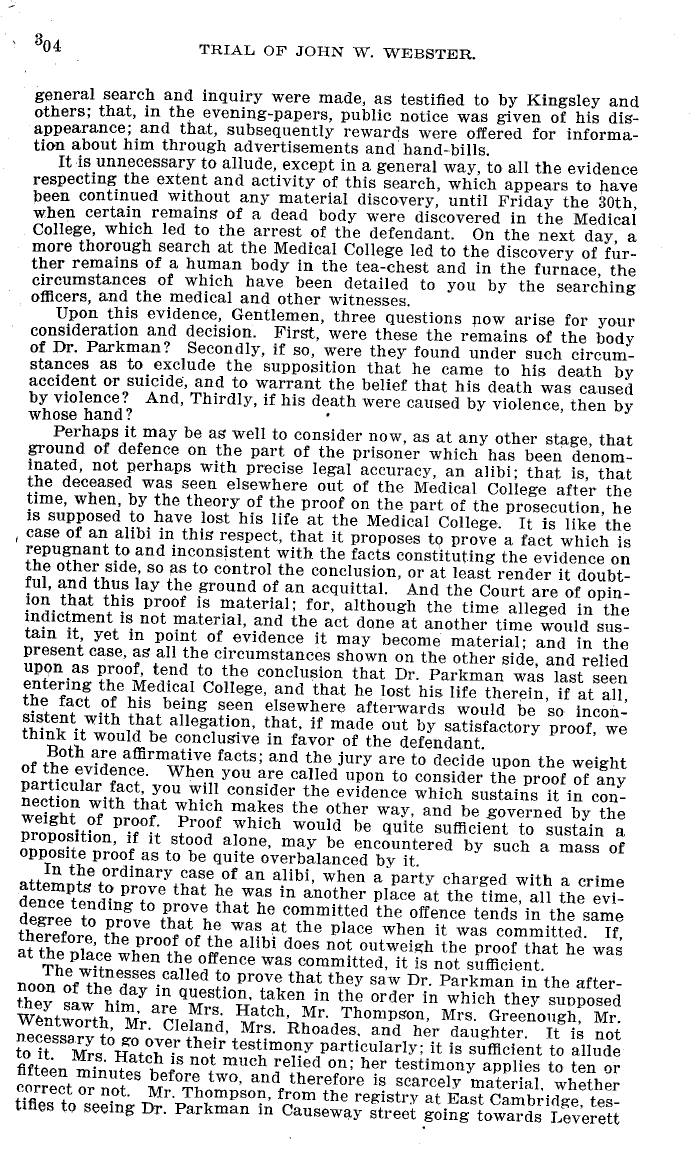|
304 TRIAL OF JOHN W. WEBSTER.
general search and inquiry were made, as testified to by Kingsley and
others; that, in the evening-papers, public notice was given of his dis-
appearance; and that, subsequently rewards were offered for informa-
tion about him through advertisements and hand-bills.
It is unnecessary to allude, except in a general way, to all the evidence
respecting the extent and activity of this search, which appears to have
been continued without any- material discovery, until Friday the 30th,
when certain remains of a dead body were discovered in the Medical
College, which led to the arrest of the defendant. On the next day, a
more thorough search at the Medical College led to the discovery of fur-
ther remains of a human body in the tea-chest and in the furnace, the
circumstances of which have been detailed to you by the searching
ofcers, and the medical and other witnesses.
Upon this evidence, Gentlemen, three questions now arise for your
consideration and decision. First, were these the remains of the body
of Dr. Paxkman? Secondly, if so, were they found under such circum-
stances as to exclude the supposition that he came to his death by
accident or suicide, and to warrant the belief that his death was caused
by violence? And, Thirdly, if his death were caused by violence, then by
whose hand?
Perhaps it may be as well to consider now, as at any other stage, that
ground of defence on the part of the prisoner which has been denom-
inated, not perhaps with precise legal accuracy, an alibi; that is, that
the deceased was seen elsewhere out of the Medical College after the
time, when by the theory of the proof on the part of the prosecution, he
is supposed to have lost his life at the Medical College. It is like the
case of an alibi in this respect, that it proposes to prove a fact which is
repugnant to and inconsistent with the facts constituting the evidence on
the other side so as to control the conclusion, or at least render it doubt-
ful, and thus lay the ground of an acquittal. And the Court are of opin-
ion that this proof is material; for, although the time alleged in the
indictment is not material, and the act done at another time would sus-
tain it yet in point of evidence it may become material; and in the
present case, as all the circumstances shown on the other side, and relied
upon as proof, tend to the conclusion that Dr. Parkman was last seen
entering the Medical College, and that he lost his life therein, if at all,
the fact of his being seen elsewhere afterwards would be so incon-
sistent with that allegation, that, if made out by satisfactory proof, we
think it would be conclusive in favor of the defendant.
Both are affirmative facts; and the jury are to decide upon the weight
of the evidence. When you are called upon to consider the proof of any
particular fact you will consider the evidence which sustains it in Con-
nection with that which makes the other way, and be governed by the
weight of proof. Proof which would be quite sufficient to sustain a
proposition, if it stood alone, may be encountered by such a mass of
opposite proof as to be quite overbalanced by it.
In the ordinary case of an alibi, when a party charged with a crime
attempts to prove that he was in another place at the time, all the evi-
dence tending to prove that he committed the offence tends in the same
degree to prove that he was at the place when it was committed. If,
therefore, the proof of the alibi does not outweigh the proof that he was
at the place when the offence was committed, it is not sufficient.
The witnesses called to prove that they saw Dr. Parkman in the after-
noon of the day in question, taken in the order in which they supposed
they saw him, are Mrs. Hatch Mr. Thompson, Mrs. Greenough, Mr.
Wentworth, Mr. Cleland, Mrs. Rhoades, and her daughter. It is not
necessary to go over their testimony particularly; it is sufficient to
allude
to it. Mrs. Hatch is not much relied on; her testimony applies to ten or
fifteen minutes before two, and therefore is scarcely material, whether
correct or not. Mr. Thompson, from the registry at East Cambridge, tes-
tifies to seeing Dr. Parkman in Causeway street going towards Leverett
|

